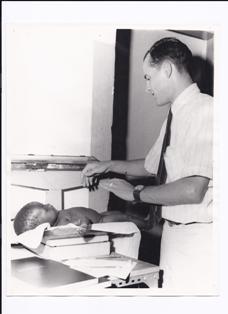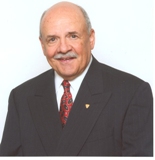A Writer Writes–Dr. Jack Allison (Malawi 1966-69)
Although Dr. Jack Allison retired from clinical medical practice in 2007 after a 30-year career in academic emergency medicine, he responded to the victims of the earthquake in Haiti in January 2010, where he treated hundreds of quake victims, and hundreds more who were without medical care. Prior to retirement, he served as Chief of Staff of the Charles George VA Medical Center in Asheville, North Carolina Before that, Dr. Allison was Chief of Staff at the VAMC in Syracuse, New York, a position he had held since 1999.
Jack presently serves as Professor of Emergency Medical Care, College of Health & Human Sciences, Western Carolina University, where he teaches, performs research, and spearheads faculty development.
In 2012 he volunteered during the month of February with Medical Teams International in Kenya and Somalia where he provided both emergency medical care and public health education to Somali refugees; and in October he volunteered with Marion Medical Mission on a public health project in Malawi and Zambia where he helped to install 112 shallow water wells.
Allison’s avocation is singing/songwriting. He has written over 100 songs and jingles, and recorded over 80 of those. Since 1967 he has raised $150,000.00 with his music, and he & his wife, Sue Wilson, have given away all of these monies to various charitable organizations, including $30,000.00 to help feed Malawian children who have been orphaned because their parents have died of AIDS
Jack is married and is the father of three daughters and one son, and has four grandchildren and one great granddaughter.
•
MY AFRICAN DOG
by Jack Allison (Malawi 1966-69)
How I met a German Shepherd named ‘Hank’ is truly amazing, and what evolved thereafter, even more so. But you can forget that name, for he was soon given a new moniker.
As a new PCV who had only been in country for five months, I had ridden my motorcycle into Blantyre, the commercial capital of Malawi, to record my second health education song. I was on my to pick up my cycle after the recording session of Ufa wa Mtedza (translated as ‘The Peanut Butter Song,’), which, much to my surprise, became the Number One Song in Malawi for the next 3 1/2 years — yet that’s another story!
Within a block of reaching the Peace Corps office, I noticed a couple with a beautiful dog on a leash walking toward me.
“Nice dog,” I exclaimed!
“Want him?” the young man asked immediately.
“You’re joking, right?” I asked.
“No. He’s yours, if you want him.”
Quickly they explained that they were Peace Corps Volunteers who were leaving Malawi after the first year of their two-year tour as secondary school teachers because their marriage had melted down. Living on Likhoma Island in the midst of Lake Malawi, apparently spending too much time alone together, had done them in. They were not afforded the luxury of the poet’s admonition: “Let there be spaces in your togetherness…”
When I expressed my ambivalence — yes, I would love to accept the dog, yet I had ahead of me a 100-mile trip back to my village on a motorcycle — they both chimed in that he was facile at riding on the cycle, and simply told me what to do.
After putting on my helmet and cranking up, I patted the gas tank and said, “Up, Hank!” He hopped up at once, put both paws across the handlebars, then turned around and licked my face. I was stunned, yet incredibly happy that I suddenly possessed such a fantastic dog.
The trip back to Nsiyaludzu Village was uneventful. He simply whimpered when he had to pee.
All the way home I nuzzled him and cooed his new name, “Iwe.” That word in Chichewa, a Bantu language akin to Swahili, is the familiar form of “you,” reserved mainly for kids and lovers, or as a derogatory term toward other adults. Whenever I would call out “Iwe” when it was time to feed him, half the children in the village would show up at my hut. Years later my wife was not initially amused when I called her Iwe as my special term of endearment for her…
Iwe and I bonded outright. He accompanied me everywhere, especially when I made cooking demonstrations in surrounding villages, including my own. We were inseparable. He slept on or beside my small cot. And although he was incredibly gentle and loving, Malawians were intimidated by his size, and gave him a wide berth.
One memorable day Iwe almost got us both killed: It was a Saturday, and I was sweltering in my hut, getting caught up with paperwork from my under-fives baby clinic, when a neighbor informed me that one of my patients was dying at the local clinic. I rushed afoot the 1/8-mile to pay my respects. The infant had measles, and was severely
malnourished. He was covered with calamine lotion, a ghostly sight, and had labored respiration. He died within minutes.
As I joined the other mothers in grieving and expressing our sympathies to the dead child’s mother, we were interrupted by a loud commotion outside.
Two men had been squatting under a shade tree, serenely getting stoned on a marijuana stogie, when Iwe relieved himself. First he cocked his leg, whizzed a tad on the tree, took two steps and squirted more urine on the first African’s back, then finished his business on the second man.
I was horrified! Although Malawians tend to be polite to the point of being obsequious, those who are drunk or stoned are not, especially when provoked.
Both men began swearing loudly and chasing the dog angrily. At first Iwe appeared to be playful, yet quickly ran home when they began to hurl stones along with a myriad of vulgar insults.
Fortunately, both gentlemen calmed down when I offered to buy them a village beer. The latter, known as “mowa,” is brewed from millet, corn and yeast. Whenever I drank the stuff I was always amazed at how easily the villagers got drunk on it, while all I got was yet another case of diarrhea…
The only other trouble Iwe got into was when he played too vigorously with a baby goat, and the goat subsequently died. The owner was livid, yet he was sober, so we were able to sort things out sans shouting, swearing, or stone throwing. It’s remarkable what twice the value of a dead goat can do to enhance international relations.
Iwe and I were together for over 2 1/2 years. He was fiercely loyal, yet never fierce. Not once did he ever growl at me. He had an uncanny sense of “friend or foe,” for he was accurately selective about at whom to bark, and those he would greet enthusiastically.
Would that I were that discerning, then, and now.

Hi Jack,
I was so impressed by what you have accomplished, as well as what you have ‘volunteered’ for throughout the years. I very much enjoyed your story about Hank, a.k.a., Iwe. It made me smile when you explained that the familiar person iwe is for children and lovers, an insult for adults. Ditto for the ‘campo’ in Chile where the formal person was always used for adults (usually coupled with Don, like Sir, preceding their first names). I actually described/explained this in the first chapter of my novel (memoirs masquerading as a novel) One For The Road which is about the adventures/love of a volunteer in Chile. I was a volunteer there-1968-70.
Thank you for your story–my wife loved it too,
David Mather
Hi Jack, we were hallmates at Taylor dorm at the University of North Carolina. I sang in the University choir and in the Madrigals. I graduated in 1966 and immediately entered the training program in Molokai Hawaii for placement at Yap Island in the Western Caroline Islands. I worked, as you did, in economic development. Working with the Yao Cooperative Association. I too have many stories to tell from my service. After the Peace Cirps I had to serve in the Army stationed in Germany and after returning home went tonwirk in Washington D.C as an economist. I now live in Redondo Beach California . If you are in this part of the world, we should meet up and reciunt our experiences.
Joseph Tillotson